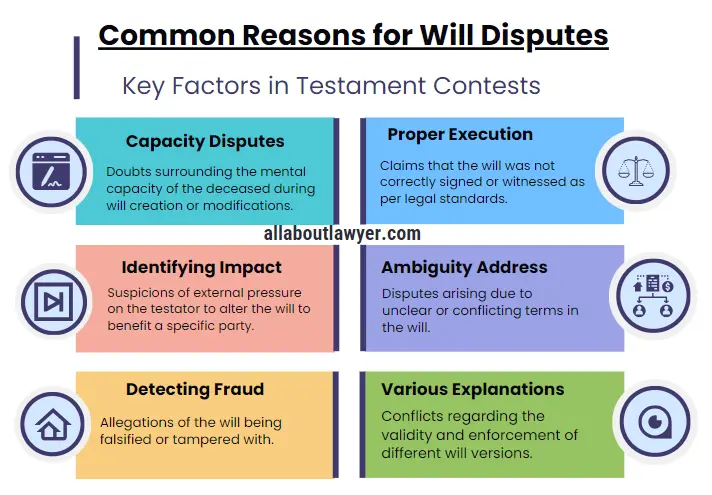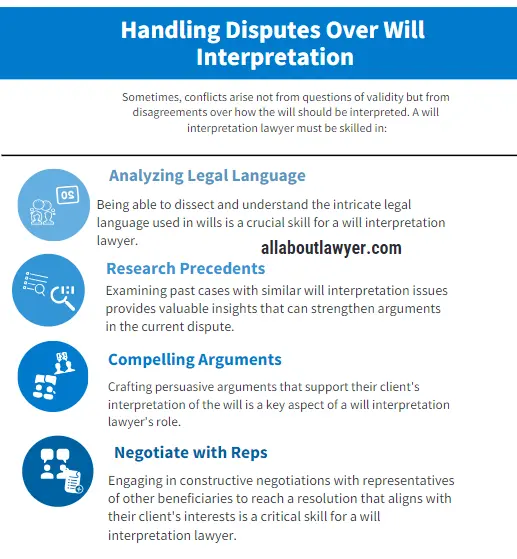Will Dispute Attorney Resolving Complex Estate Contestations
When a loved one passes away, the last thing anyone wants to deal with is a dispute over their will. Unfortunately, estate conflicts are more common than many people realize. In these challenging situations, a will dispute attorney can be an invaluable ally. This comprehensive guide will explore the role of these legal professionals, the common reasons for will disputes, and how they can help resolve complex estate litigation issues.
Table of Contents
Understanding the Role of a Will Dispute Attorney
A will dispute attorney, also known as an estate litigation lawyer or probate dispute counsel, specializes in resolving conflicts that arise during the probate process. These legal professionals have in-depth knowledge of estate law, probate procedures, and the intricacies of will contestation. Their primary goal is to protect their clients’ interests and ensure that the deceased’s true intentions are honored.
Common Reasons for Will Disputes
Several situations can lead to the need for a testament contestation expert. Some of the most frequent reasons include:
1. Lack of Testamentary Capacity: Questions about whether the deceased was of sound mind when creating or modifying the will.
2. Undue Influence: Suspicions that someone exerted pressure on the testator to change the will in their favor.
3. Fraud or Forgery: Allegations that the will is not genuine or has been tampered with.
4. Improper Execution: Claims that the will wasn’t signed or witnessed according to legal requirements.
5. Ambiguous Language: Disputes arising from unclear or contradictory wording in the will.
6. Existence of Multiple Wills: Conflicts over which version of the will is valid and should be executed.
7. Omission of Heirs: Concerns about family members being unexpectedly left out of the will.

The Will Contest Process
When a will is contested, a specific legal process unfolds. A bequest disagreement advocate will guide their client through the following steps:
1. Filing a Petition: The process begins with filing a formal petition with the probate court to contest the will.
2. Gathering Evidence: The attorney will collect documentation, witness statements, and expert opinions to support the case.
3. Negotiations: Often, there’s an attempt to resolve the dispute through mediation or negotiation before going to court.
4. Court Proceedings: If a settlement can’t be reached, the case will proceed to trial in probate court.
5. Appeals: If necessary, the attorney can handle appeals of the court’s decision.
Roles and Responsibilities of a Probate Contest Attorney
A skilled estate conflict mediator takes on various responsibilities to protect their client’s interests:
1. Legal Counsel: Providing expert advice on the merits of the case and potential outcomes.
2. Investigation: Conducting thorough research into the circumstances surrounding the will’s creation and execution.
3. Strategy Development: Crafting a compelling legal strategy tailored to the specific circumstances of the case.
4. Representation: Advocating for the client’s interests in negotiations, mediation, and court proceedings.
5. Documentation: Preparing and filing all necessary legal documents and court papers.
6. Expert Coordination: Collaborating with financial experts, medical professionals, and forensic specialists as needed.
The Importance of Testamentary Capacity
One of the most common grounds for contesting a will is questioning the testator’s capacity. A testamentary capacity lawyer must be well-versed in the legal standards for determining whether an individual was of sound mind when creating their will. This often involves:
1. Assessing medical records
2. Interviewing witnesses who interacted with the testator
3. Consulting with medical experts
4. Examining the complexity of the will in relation to the testator’s cognitive abilities
Undue Influence: A Complex Challenge
Cases involving allegations of undue influence are often complex and emotionally charged. An inheritance rights defender must carefully investigate the relationships between the testator and beneficiaries, looking for signs of manipulation or coercion. This might involve:
1. Analyzing communication records
2. Examining financial transactions
3. Interviewing caregivers and family members
4. Assessing the testator’s vulnerability to influence
The Role of Mediation in Will Disputes
Many will disputes can be resolved through mediation, avoiding the need for a lengthy and costly court battle. A skilled estate dispute resolution expert will often attempt to settle conflicts through this process, which offers several advantages:
1. Faster resolution
2. Lower costs
3. Preservation of family relationships
4. Confidentiality
5. More flexible outcomes

Handling Probate Court Proceedings
When mediation fails, the case may proceed to probate court. A probate litigation specialist will guide their client through this complex process, which typically involves:
1. Pre-trial discovery
2. Depositions
3. Expert witness testimony
4. Presentation of evidence
5. Cross-examination of witnesses
6. Closing arguments
The Importance of Expert Witnesses
In many will dispute cases, expert witnesses play a crucial role. A testament challenge attorney may call upon various professionals, including:
1. Medical experts to testify about the testator’s mental capacity
2. Handwriting analysts to examine signatures
3. Financial experts to assess the value and distribution of assets
4. Psychology professionals to provide insights on undue influence
Handling Disputes Over Will Interpretation
Sometimes, conflicts arise not from questions of validity but from disagreements over how the will should be interpreted. A will interpretation lawyer must be skilled in:
1. Analyzing legal language
2. Researching precedents in similar cases
3. Presenting compelling arguments for their client’s interpretation
4. Negotiating with other beneficiaries’ representatives
The Impact of Estate Planning on Will Disputes
Proper estate planning can significantly reduce the likelihood of will disputes. An estate planning litigation expert can advise clients on strategies to minimize the risk of future conflicts, such as:
1. Regular updates to the will
2. Clear communication with family members about intentions
3. Use of trusts to control asset distribution
4. Including explanations for unexpected decisions in the will
International Aspects of Will Disputes
In our globalized world, it’s increasingly common for will disputes to involve international elements. An inheritance law specialist dealing with cross-border issues must be familiar with:
1. International inheritance laws
2. Conflict of laws principles
3. Treaties and conventions governing international estates
4. Procedures for enforcing foreign judgments
The Emotional Toll of Will Disputes
Will contests often take a significant emotional toll on all parties involved. A compassionate bequest contestation counsel should be prepared to:
1. Provide emotional support to clients
2. Recommend counseling or support groups when appropriate
3. Strive to preserve family relationships where possible
4. Balance the pursuit of legal rights with sensitivity to emotional needs
Technological Advancements in Will Dispute Resolution
The field of estate litigation is evolving with technological advancements. Modern will dispute attorneys may utilize:
1. Digital forensics to investigate electronic wills
2. AI-powered document analysis for faster review of complex estates
3. Virtual mediation platforms for remote dispute resolution
4. Blockchain technology for more secure will storage and execution
Costs and Fee Structures Of Will Dispute Attorney
Understanding the financial aspects of engaging a will executor conflict specialist is crucial. Common fee structures include:
1. Hourly rates
2. Contingency fees (in some jurisdictions)
3. Flat fees for specific services
4. Hybrid arrangements
Clients should discuss fees upfront and understand what costs they may be responsible for beyond legal fees, such as court filing fees or expert witness costs.
Choosing the Right Will Dispute Attorney
Selecting the right legal representation is crucial in will contest litigation. Consider the following factors:
1. Experience in similar cases
2. Track record of successful resolutions
3. Communication style and availability
4. Understanding of family dynamics
5. Approach to dispute resolution (litigation vs. mediation)
6. Fee structure and transparency
Conclusion
Navigating a will dispute can be one of the most challenging experiences a family can face. The expertise of a skilled will dispute attorney can make a significant difference in resolving these conflicts fairly and efficiently. Whether through mediation, negotiation, or litigation, these legal professionals play a crucial role in upholding the rights of beneficiaries and honoring the true intentions of the deceased.
As estate law continues to evolve and new challenges emerge, the role of the will dispute attorney remains essential in ensuring justice and fairness in the distribution of estates. By understanding the complexities of these cases and the value of expert legal guidance, individuals can better protect their rights and navigate the difficult terrain of estate conflicts.
Related Articles For You:
Can a Lawyer Be an Executor of a Will?
FAQs
Q: How long do I have to contest a will?
A: The time limit for contesting a will varies by jurisdiction but is typically between a few months to a year after the will is admitted to probate. It’s crucial to consult with an attorney as soon as possible to ensure you don’t miss the deadline.
Q: Can a will be contested if it includes a “no-contest” clause?
A: Yes, a will can still be contested even if it includes a no-contest clause. However, the challenger risks losing their inheritance if they lose the contest. An experienced attorney can advise on the risks and potential outcomes.
Q: How much does it cost to contest a will?
A: Costs can vary widely depending on the complexity of the case and the attorney’s fee structure. Simple cases might cost a few thousand dollars, while complex litigation can run into tens or hundreds of thousands. Many attorneys offer free initial consultations to discuss potential costs.
Q: Can a will be contested after probate has been granted?
A: In most jurisdictions, it is possible to contest a will after probate has been granted, but the process is often more challenging and subject to stricter time limits. Prompt action is always advisable in will dispute cases.
Q: What happens to the estate during a will contest?
A: During a will contest, the distribution of the estate is typically frozen until the dispute is resolved. The court may appoint a temporary administrator to manage the estate’s assets during this period.
About the Author

Sarah Klein, JD, is an experienced estate planning attorney who has helped clients with wills, trusts, powers of attorney, and probate matters. At All About Lawyer, she simplifies complex estate laws so families can protect their assets, plan ahead, and avoid legal headaches during life’s most sensitive moments.
Read more about Sarah
